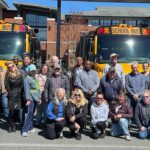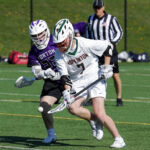The Commission on Disability held its first meeting Monday night, electing officers and outlining goals for community engagement and awareness of accessibility issues in town.
Holly Morand, also a School Committee member, was elected chair in a 4-0 vote. Alex Danahy was selected as vice chair.
Morand discussed the state’s approach to commissions on disability, which can be tailored to meet the needs of individual communities. The primary focus of these commissions is “to promote the inclusion of people with disabilities in all aspects of community life,” according to the state’s website.
To learn more about the town’s goals for the commission, members said creating a community survey is vital. It would be available online and at public places in town such as the library and the Senior Center. It also potentially could be available at athletic events in town. To increase accessibility to the survey, it would be available in large print and have a QR code. Volunteers could aid residents who are visually impaired or need help filling it out. One model for it is the senior needs assessment that is being released this week.
Member Amy Ritterbusch, who also serves on the Select Board, noted that an ideal time for distribution would be at the Special Town Meeting on Nov. 13. Preparing this survey will be the commission’s primary initial focus, and members said they would contribute to a preliminary draft that will be reviewed at the next meeting on Oct. 2.
Member Nancy “Punky” Drawe, who also serves as the chair of the Housing Authority and the Council on Aging, noted that many municipal and private buildings are not accessible to people with physical disabilities. Input from the community on the buildings they find challenging to access can lead to discussions on modifications. Members suggested looking into grant opportunities for building modifications.
Member Nancy Richards-Cavanaugh, who also serves as chair of the School Committee, said she would like to receive information from the town’s building department on whether the commission has the ability to recommend changes to private buildings. Sometimes, although a private building may legally be deemed ADA compliant, members said they have experienced challenges that those without firsthand experience may not realize exist. Ritterbusch pointed out that families of people with disabilities may choose not to go to certain restaurants because one member cannot access them.
Morand noted that another community concern addressed for the first time at May’s Annual Town Meeting was the availability of an American Sign Language (ASL) interpreter and closed-captioning for those who are hearing impaired. She also mentioned the challenges that neurodiverse people can experience at large gatherings such as this because of the crowd size and noise.
Finding accessible parking also is a challenge. Drawe noted that designated parking spaces sometimes are not located near building entrances, posing an obstacle. Also, door and threshold configuration can make it challenging for a person who uses a wheelchair to gain access.
Said Morand: “I think unless you’re having to manage that, you would have no idea how totally inaccessible that is.”
Danahy said some heavy doors don’t have push buttons, making buildings inaccessible to people who cannot physically open them. Having a step to go up to a ramp at one building also makes no logistical sense, Drawe added. Richards-Cavanaugh noted that people who use assistive devices other than wheelchairs “can often be overlooked.”
“One step can make a difference,” Drawe said. “People have to be made aware and put in our shoes. It’s not something that we should have to deal with every day.”
Concerns such as these, Richards-Cavanaugh said, need to be mentioned to the Elementary School Building Committee so that they can be incorporated into the design of the proposed new school. She suggested compiling a town building inventory of accessibility issues.
One such issue Danahy pointed out as “a danger” is the lack of a handrail at the library, which people with mobility issues would use for balance.
Said Danahy: “What I was told is that it didn’t look good aesthetically to do it. That’s always rubbed me the wrong way.”
One obstacle to accessibility at the Town Common is the bricks, which Drawe said can hinder people with wheelchairs and canes. People blocking accessible parking spaces was another concern raised, prompting a discussion about delivery companies and others using them illegally while leaving their vehicles running because they consider it live parking.
Danahy added that officers have told him they won’t enforce parking violations in accessible spaces “because it is a waste of our time.”
Ritterbusch added that some people park on the sidewalks, hindering accessibility.
Another issue arose at June’s Pride Parade, Morand said. There were no places on the Town Common for people with physical disabilities to sit because people assumed that attendees would bring their own chairs or blankets. This commission could provide expertise for events like this regarding accessibility and inclusivity and give organizers a checklist.
Trail access was another point raised. Danahy said that Trails Committee chair Peter LaGoy asked him to be a consultant on trail accessibility “from a wheelchair perspective.” Issues such as grading and surface texture will be reviewed. He mentioned advocates in Maine and Massachusetts with whom he can consult.
He added that many people who use wheelchairs turn away from outdoor events because they don’t believe them to be accessible or don’t know to whom to address concerns when they are not.
One model program used at the Hopkins School is called “Understanding Our Differences,” Morand and Richards-Cavanaugh said. Students are educated about the challenges experienced by people with visual, mobility and sensory disabilities.
Eventually, commission members said they would like to engage state legislators as well as the Massachusetts Commission on the Status of Persons with Disabilities. They also spoke about holding a hybrid public forum on Jan. 22.






















Great job, Mary Ellen! Thank you! This is going to be an awesome committee!